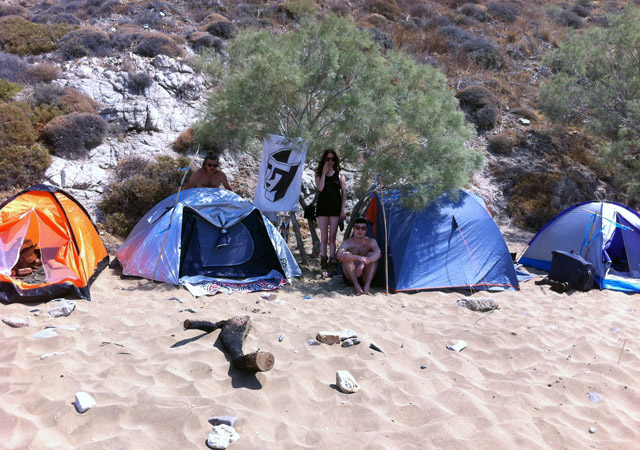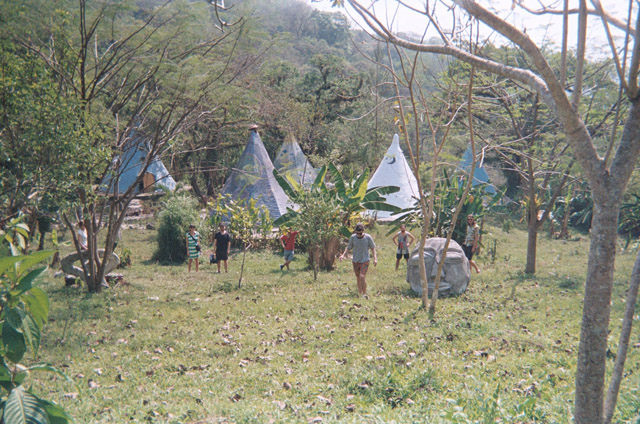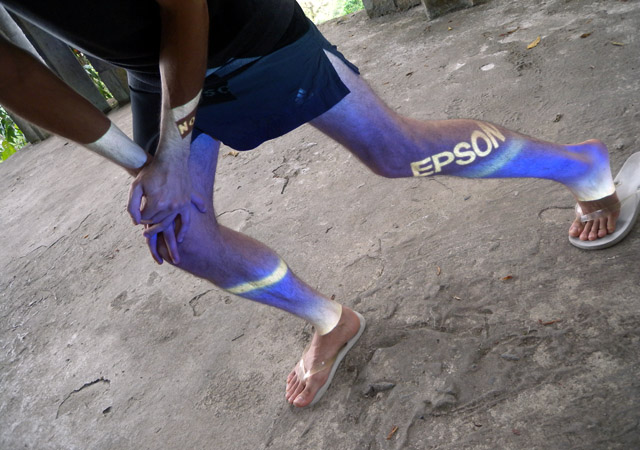He’s not one for camping but prefers to be near nature, an Internet artist looking to disconnect from it, a human seeking community in isolated places. Athens-based artist Angelo Plessas’ ideology is a contradiction in terms leading to a spiritual pursuit via a medium grounded in hard science and human-made technologies – The Eternal Internet Brotherhood. It’s an online and offline art initiative and remote residency, bringing net-based artists, technologists, researchers, writers and publishers from around the world to a single physical location, with metaphysical properties, to disconnect, dislocate and interact with like minds for a short stretch of time, away from the noise of civilisation.
Just to clarify, #ETINTERBRO is not limited to ‘brothers’: “when you translate the word ‘brotherhood’ in Greece, it’s αδελφότητα (adelfótita), which means people are getting together to do something,” Plessas volunteers through video chat from his home in the Greek capital, “I thought about putting ‘sisterhood’ later but then it’s becoming too long and I think, ‘ok, it’s a post-gender moment’.”

A post-gender basis for a post-internet movement, focussed on integration. Now in its third year, with previous participants including the likes of Attilia Franchini, Rózsa Farkas, Jesse Darling, Harry Burke and Yuri Pattison, the idea of getting away in order to get in touch was originally birthed in the audience of a Biennial panel discussion: “I was having friends and people asking me, ‘why, in Greece, there is no residency or artist run spaces?’,” says Plessas, “so I made this question to these people and they responded in a way that was, ‘we cannot do everything. You do it!’ which was quite clever.” From an irate reply came the impetus, and before long #ETINTERBRO had gone well beyond an abstract idea, of escaping the turmoil of Greek bankruptcy to southern India and starting an “Internet art ashram”, to conceptualising a fantasy tour of an historical and out-of-bounds island during a Dazed & Confused takeover led by LuckyPDF. “I started getting emails from people asking how they can participate. But even the island was totally utopic because Delos is this uninhabited archaeological site. It’s totally forbidden.”
By the Summer of 2012, though, Plessas and a handful of artists found themselves on the remote mythological island of Anafi, accessible only by boat, in what would be the first of an ongoing project as The Eternal Internet Brotherhood: “We went to this very beautiful beach. We set up this really nice camp and we said, ok, ‘let’s stay there for seven days’. It was so experimental. I’ve never done camping in my life,” he adds.
Since then there’s been a trip to the surrealist park of Las Pozas in Xilitla, perched on a rainforest mountain, and a renewed indiegogo campaign for a planned trip to the Dead Sea this coming April. “Somehow, when there is no money involved, where there is no hidden agenda involved, you feel much more liberated to do things that in another situation you would never think,” says Plessas about the totally independent initiative born from an increasingly “unbearable” situation in Greece –government funding there being out of the question.
That’s part of the reason why he’s seeking out the specifically “therapeutic” effects of a natural resource, situated at the centre of political conflict (the area borders Israel and Palestine) while instigating a potentially costly artistic exercise in the middle of a financial crisis. But then, its one of those queer dualities of life, where innovation comes with adversity, creativity from contingency, and ritual communion in total isolation.

In terms of this focus on therapy with the Dead Sea, do you see any parallels between the art and the commercial worlds? Moving from a corporate aesthetic and then into these ideas of mediation, there’s an element of mirroring the behaviours of people in the workforce.
AP: I was reading this book recently, where all these corporate situations –in either the art world or real corporations –they’re just appropriating some sort of a ‘green’ attitude. Still they are corporations, money’s the goal, plus all these neoliberal factors. They are appropriating all these green things that can make their profile somehow more human, more relaxed. It’s a mosaic. I mean, there is also some element of that in art but it’s also a counter-cultural situation so it’s good.
We just have to see because I feel in general, there is this financial crisis that we entered now and we are also entering a very, very big social crisis as a people. Even for the Internet, for example, even though since the time I started working with it in the late-90s, which was totally different, it became more participatory but at the same time it’s more dystopian, it’s more corporate and, I don’t know, it supports some individualistic attitude. All this information pollution we have, we are always distracted; all this makes us unbalanced. And because we tend towards the urge for more visual stimulation, we are addicted to it. Everything at the end is becoming instantly old, boring and uninteresting. That’s why I’m thinking, with this project, that it revives a bit of the spirit of communion, ritual and community.
When you talk of this ‘social crisis’, and obviously money, there’s still a certain set of people that have access to the Internet, and high-speed Internet. When it comes to artists working online, it’s still centralised around those major cities like Berlin, New York, London…
AP: Exactly. There is a very transitional moment now. People are just rethinking what it is and where we are going in this situation. Actually, I live in a city but I choose to live in a ‘semi’ situation. I personally always want to have a very powerful organic setting around me. If I show you around here, I have a view of the sea.
I don’t like to be in the city and to be caged in little apartments in the centre and downtown here. Also, practically speaking, in my city the downtown area is becoming –because of the crisis –really, really, really unbearable sometimes. But also, this reality of the city in general, is becoming a little bit more unbearable. I think we should go back to nature, at least for a while; stay there and forget what the city’s all about.

Living in a bigger city, it does drive you a bit crazy.
AP: Exactly. I was in Berlin two days ago and I realised, it’s great to be in Berlin, but there’s too much art context there; there is too much information, too many things. I have this motion towards disconnection from this hyper-connected hyperactive thing. It’s an attitude which is so contemporary and you see it everywhere now.
So there’s the therapeutic element to situating the project on the Dead Sea but there’s this whole political situation there. Is that sort of a nudge to this ‘privilege of escape’ that the ‘Brotherhood have as artists, that maybe someone in Palestine, for example, doesn’t?
AP: This is a very good point because, it sounds a little bit too activist maybe but I strongly believe all the people in the world should have the same right to be mobilised and move around the world, equally with others. That’s why I chose this place because, apart from this interesting therapeutic part, it has also this conflicted side; it’s the place where everybody wanted to have a piece of the history over there. They’re things that, people like you and me, we’ve never experienced.
Do you think that you’ll encounter any problems?
AP: You mean, politically? So far I’ve never been there, so there might be some impromptu things but I like this organic evolution of the project. It depends on how we get there, physically, and the physical conditions are evolving how this project is taking shape. I have all these ideas of how things can work and evolve. It’s very unpredictable there. That’s also why I chose that place.
It’s like the ‘IRL glitch’ that you might lose when working exclusively online.
AP: There might not be Internet there. There are three options of where we’re going to stay. There’s an open air one –it’s on a slope and it has this beautiful house –and another, they have these beautiful huts and the other is a another remote place, so I don’t know how connected we will be there. Actually, we will be totally dislocated and disconnected, which is somehow inspiring for me and that’s the goal of the project. It’s a very, very economical way also, to do something with other people. Already the list is around fifteen people and everybody is cool, easy-going, younger and older, local and totally dislocated; people coming from different places, so yeah, we will see. **













